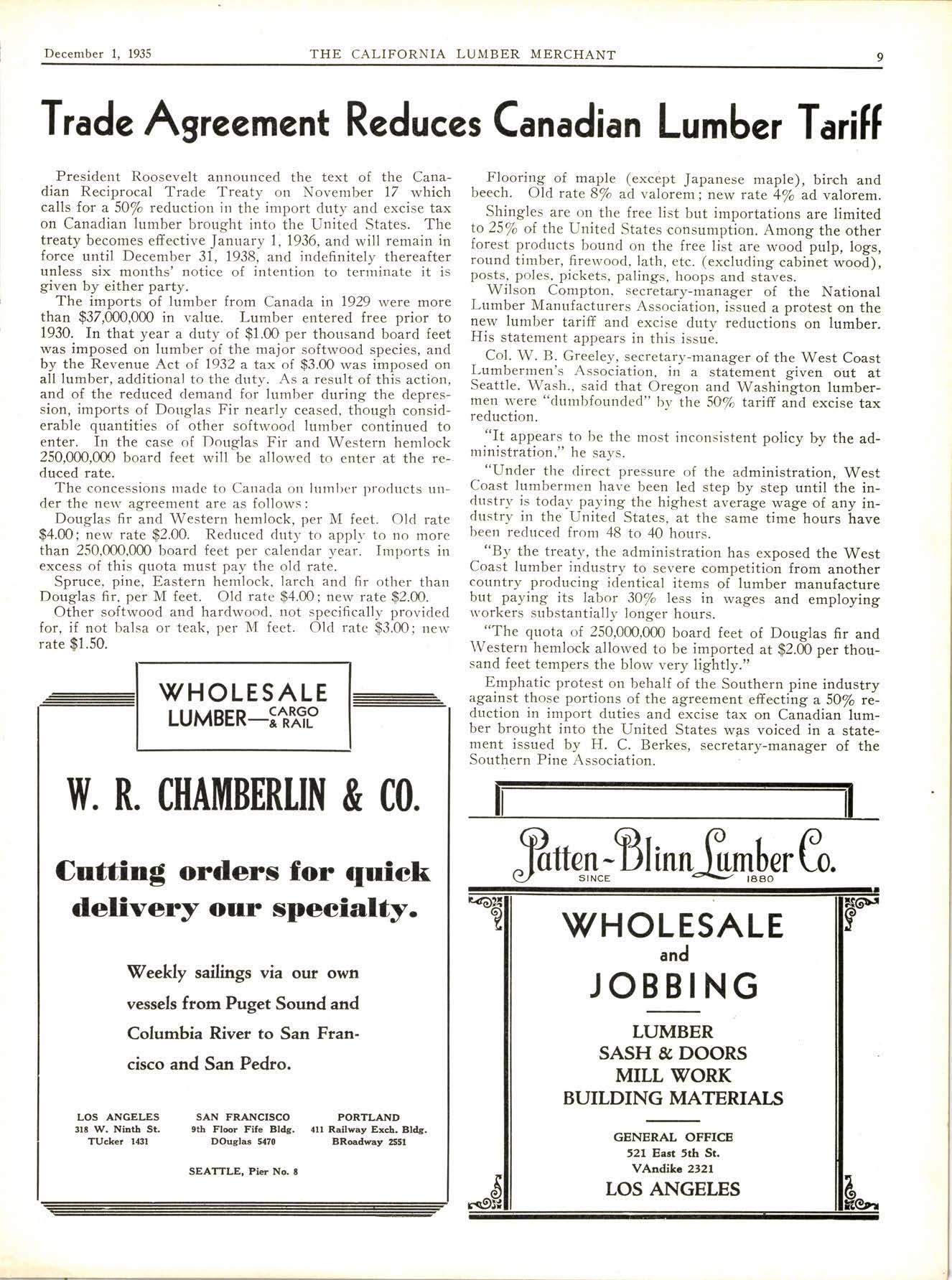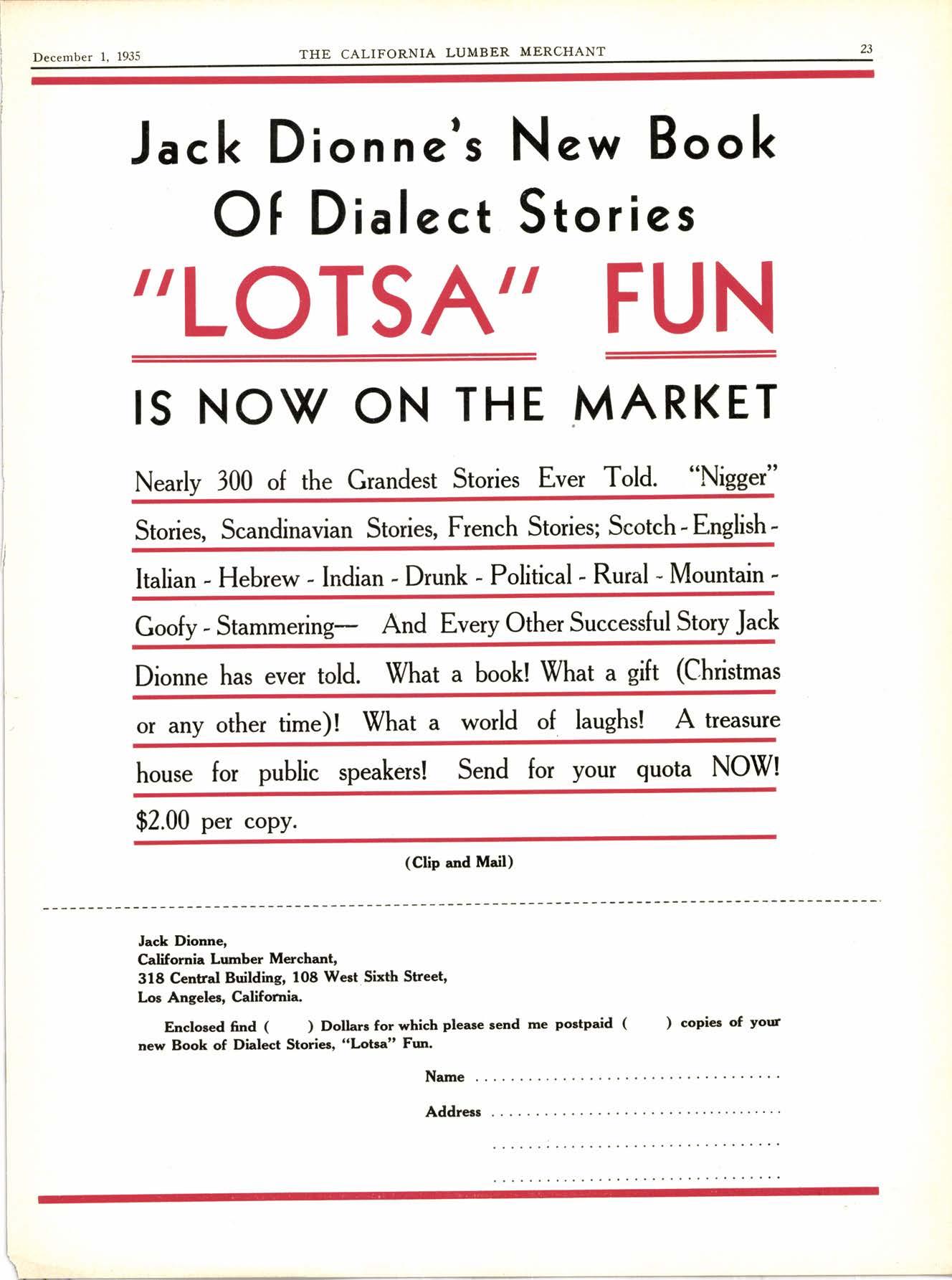
6 minute read
Statement oJ \Tilson Compton, Manager, N. L. M. A. on Canadian Agreement
Washington, Nov. 18.-"Glittering phrases about stimulating "sound and healthy trade" do not ,con'ceal the fact that ln the Trade Treaty with Canada the forest produ'cts industries and their employees have been sacrificed for the promised benefits to other industries or other interests reiarded as more "deserving". The fifty per cent general ieduction of tariffs on all lumber is a stunning blow not only to the promising tide of recovery in the forest products industries but also to the tens of thousands of employees awaiting an opportunity for reemplol'ment. The consequenceJ are the most destructive in the Pacific Northwest only because Washington and Oregon are more compleiely dependent upon forest products than are the tNortheastein and Lake States, where produ'cts are similarly affected.
"In British Columbia the minimum wage in sawmills is 35c an hour. In Washington and Oregon, 50c. In British Columbia average wages are 44c for a 48 hour week; in Washington and Oregon, 63c for a 40 hour week. British Columbia, not subject to the same restrictive shipping laws, has an advantage over Washington and Oregon in the cost of ocean transp'ortation averaging more than $2 p9r thousand feet of lumber. It has a tariff preferential in British Empire markets sufficient at least to have practically excluded American lumber. It imposes a 25 per cent tariffl-now reduced to 20 per cent,-on all dressed lumber imported from the United States, a higher tarifi_ rate than his ever been imposed by the United S'tates on Canadian lumber.
"British Columbia produces the same species of lumber as Washington and Oregon. In the United States are scores of mills and logging camps unable to operate and tens of thousands of men unable to find employment because of inadeguate demand for their products. Nearly twothirds of the lumbdr producing capacity of Washington and Oregon is now idle. Nevertheless the Government, in the present Canadian treaty, seeks deliberately to turn over to Canadian competitors scarcely a stone's throw distant, an annual market for a quarter billion feet of fire and hemlock lumber. This is e,conomi,c nonsense. The grounds trpon which it is sought to be justified are as fallacious as the results themselves are destructive.
"Nor is there any substantial reciprocity. There is no substantial opening of Canadian markets to American woods; no break in the vicious svstem of preferential tarifis in the British Empire by virtue of which Canadian lumber has virtually eradicated Ameri,can lumber from many of its former principal foreign markets; no safeguard against automatic extension of lumber tariff redu'ctions to other lumber exporting countries rvhich, like Russia, are known to have the ambition and the purpose, none too secret although not broadcast, of penetrating the American market with Russian lumber eventually to the extent of billions of feet.
"To describe as an act of good neighborliness a transaction which deliberately sacrifices one industry and those dependent on it for livelihood for the benefit of other indnstries is lacking in candor. Good neighborliness at ho'me, although perhaps less spectacular, is just as important as good neighborliness abroad. The tens of thousands of persons who are dependent for a livelihood upon the lumber and timber products industries whi'ch heretofore have been vigorously seeking to maintain the higher wage and labor stindards, conservation progress and security of employ- ment urged upon them by the Government, are dumbfounded by this eviden,ce of the willingness of the Government, through use of its discretionary powers under the Trade Agreements Act, to deprive these industries of the principal protection for these higher industrial standards. The force of the blow is not lessened by the obvious fact that these industries have been sacrificed for concessions alleged to be of greater value to other groups ambitious for further extensions of their products into foreign markets. fncreased international commerce bought by these means is purchased at a high price.
"The lumber industry in the course of hearings and negotiations with respect to the Canadian Trade Treaty during the past eight months proposed to the Government a definite plan which, if it had been adopted, would have eventually disposed of the troublesome lumber tariff issue as between the United States and Canada on a fair permanent basis. Canada has an exportable surplus of lumber and timber products of a number of species scarce in the United States. The United States similarly has an exportable surplus of timber produ'cts of species scarce or non-existent in Canada. ft was proposed that these surpluses be mutually exchanged for scarcities; that for this purpose import tariffs be substantiaily redu'ced; and that as to still other species in great surplus in both countries, reasonable tariff protections to domestic markets be maintained in both directions.
"Such a poli'cy, if followed, would have opened the u'ay for great increases in the volume of the international trade in lumber and timber produ'cts. Such foreign competition could have been reasonably absorbed without destructive effect. Instead of that the Government has now deliberately opened the American market to surplus production in Canada of fir and hemlock lumber to be transoorted in millions of feet into American markets past idle American sawmills whose hundreds of employees are hungry for employment in manufacture of identical woods in this country.
"Over 2ffi,m workers normally dependent on the lumber industry are still without fheir''crlstomary employment. The volume of lumber production is less than onehalf. of. 1929. Lumber prices at the sawmills are still 20 per cent below pre-depression levels. The ,claim that the treaty will enlarge the opportunities for foreign commerce and the sale of surplus production finds a cold reception in the lumber industry in which only this year has there been substantial recovery from the effects of almost continuous over-production for a decade past. Even more chilling is the claim that the treaty means 'reempl,oyment of idle workers' when half of its normal employees are on relief rolls or eking out an existence in odd and temporary employments. No industry has gven more vigorous and whole-hearted support to the Administration program for increased wages and shorter hours; or its appeal for greater progress in forest conseivation and toward the establishment of permanent sour'ces of forest-industry employment.
"The lumber industry during the past several months has frankly laid its facts before the Agencies of the Government responsible for negotiating the foreign trade agreements. In the interest of constructive restorations of foreign trade it affirmatively recommended extensive reductions in tariffs on many of its own products, with comparable reductions in Canadian tariffs, and the sound rea- sons, in public as well as industry interest, for these recommendations.
"It is now made clear that these facts finally have been ignored. The Government was given the opportunity for the first time in this century of establishing, with the cooperation of the industry itself, a sound basis for a permanent disposal of the difficult problem of inter-national trade in lumber and timber products as between the United States and Canada. Instead of using the opportunity, the Government has now plunged the matter into even deeper controversy and in so doing has denied itself the willing cooperation of the Ameri,can lumber industry at large and has committed itself, temporarily at least, to a policy in conflict with the policies of its own prin'cipal recovery and conseryatron agen'cles.
"As yet the full significance of this action to retard recovery in a major industry, or to for,ce it, in the face of governmentally-fostered foreign competition, to resort to the gradual destruction of the higher labor-employmentconservation standards whi,ch it has gradually been building up, has not been fully developed. Needless to say, the industry along with others in similar cir,cumstances, will examine the constitutionality of the Trade Agreements Act."
To Sell Throush Retail Yards
Announcement is made by J. H. Baxter & Co., San Francisco, that Howard Jayne, formerly of Portland, is now handling for them the introduction of lumber pressuretr.eated with zinc chloride and creosote for underpinning in home construction.

This company is making a special effort to put all this business through retail lumber yards. They have stocks of ,creosoted lumber at their Alameda vard.
Franklin W. Trower
Franklin W. Trower, 28, former Oakland sports writer and student of the University of California, passed away at his home in Oakland, November 9, after an illness of more than a year.
Mr. Trower was the only son of Frank W. Trower, well known San Francis,co wholesale lumberman. After leaving the university he was in the lumber business for some time, having worked in the West Oregon Lumber Co., Linnton, Ore.; The Red River Lumber Co., Westwood, Calif., and the Quincy Lumber Co., Quincy, Calif.
For two years he was on the staff of the Oakland Tribune, and later, prior to his illness, was secretaly of the Northern California Roofers' Association.
He is survived by his father and mother, Mr. and Mrs. Frank W. Trower; his widow, a son. Donald, 6, and one sister, Elizabeth Blake Trower, all of Oakland.
Services were held at the Grant D. Miller chapel, Oakland, November 12, conducted by Rev. T. T. Giffen, pastor of Plymouth Congregational Church.
PORTL.AND LUMBERMAN VISITS S. F.
Myron C. Woodard, president, Westport Lumber Co. and Silver Falls Timber Co., Portland, was recently in San Francisco on business.
GEORGE GERLINGER VISITS S. F.
George T. Gerlinger, president of the Willamette Valley Lumber Co., Dallas, Ore., was a San Francis,co visitor around the middle of November.
Consistently soft-textured, double-end trimmed, ond Continuous assures the correctfy manufactured, accurately machined , properly kiln-dried, smoothly uniformly graded, E\flAUNA KLAMAIH PINE certoinlv lS the onswer. yedr-round operdtion with ample modern dry-kiln cdpdcity/ dealer of dependable shipments of stroight or mixed cars.










